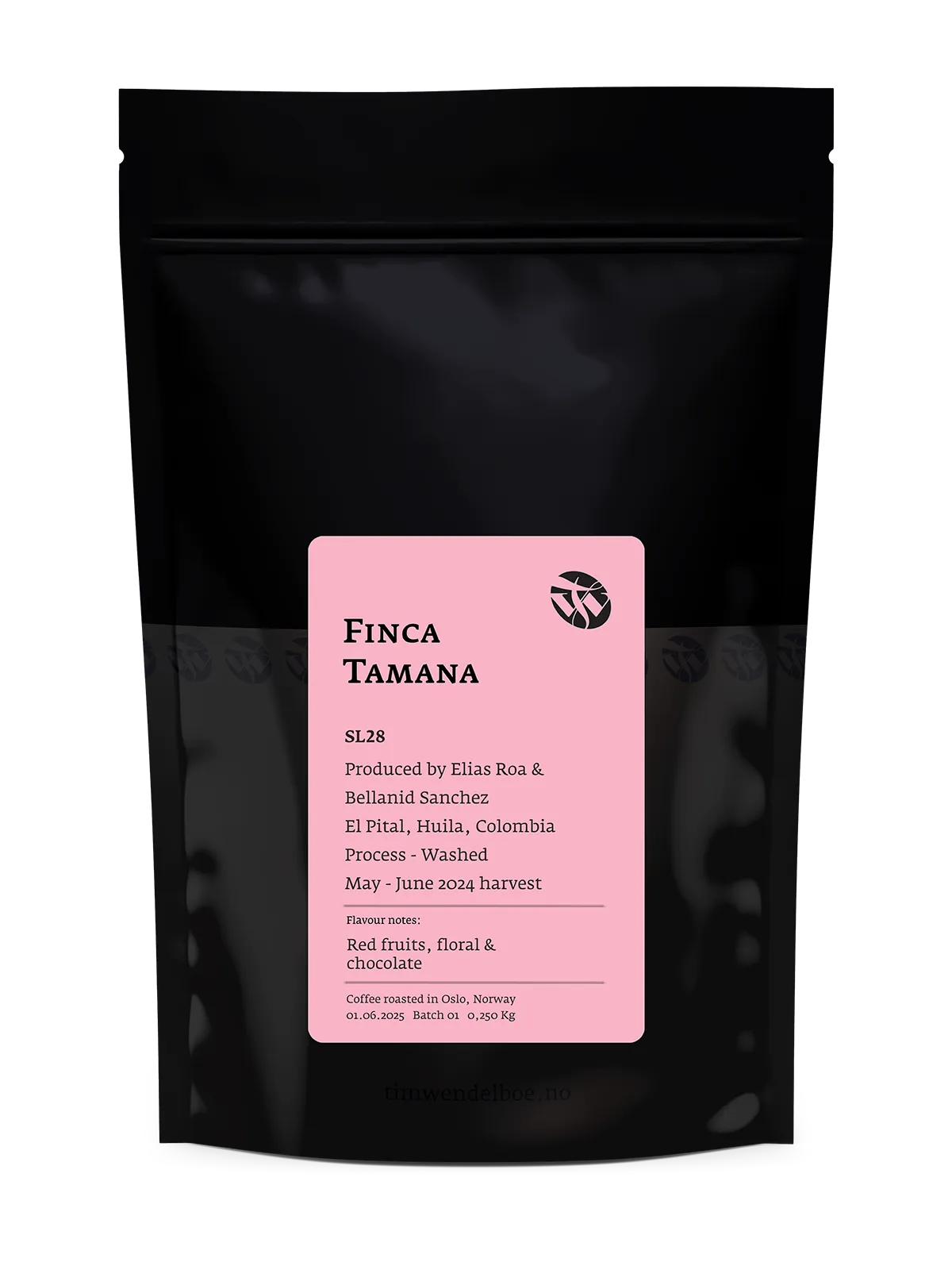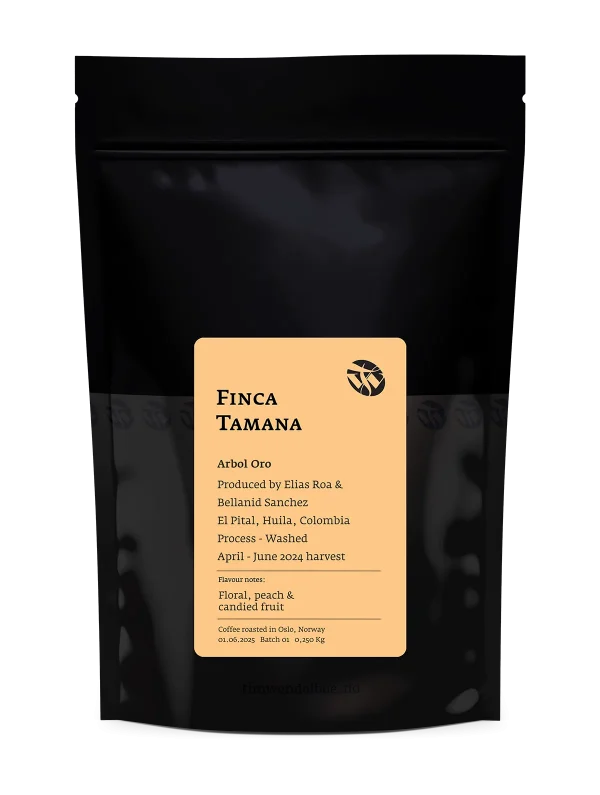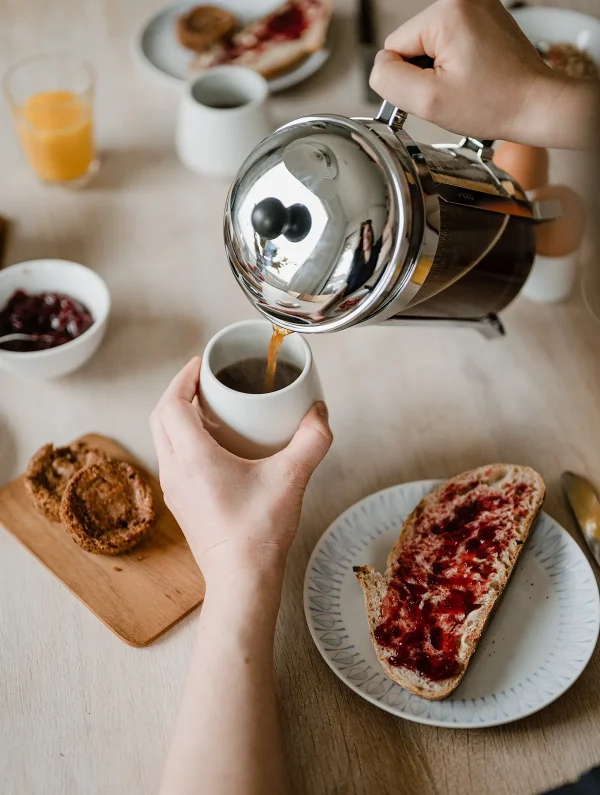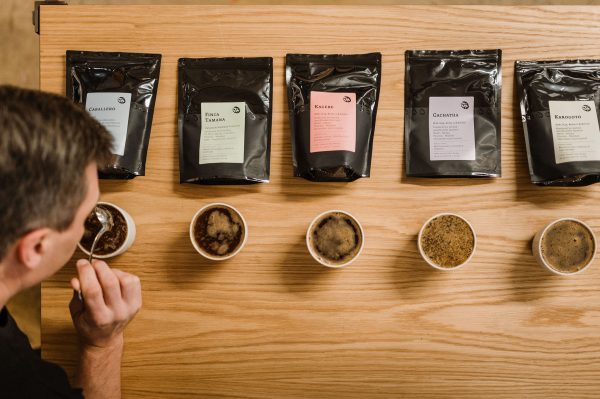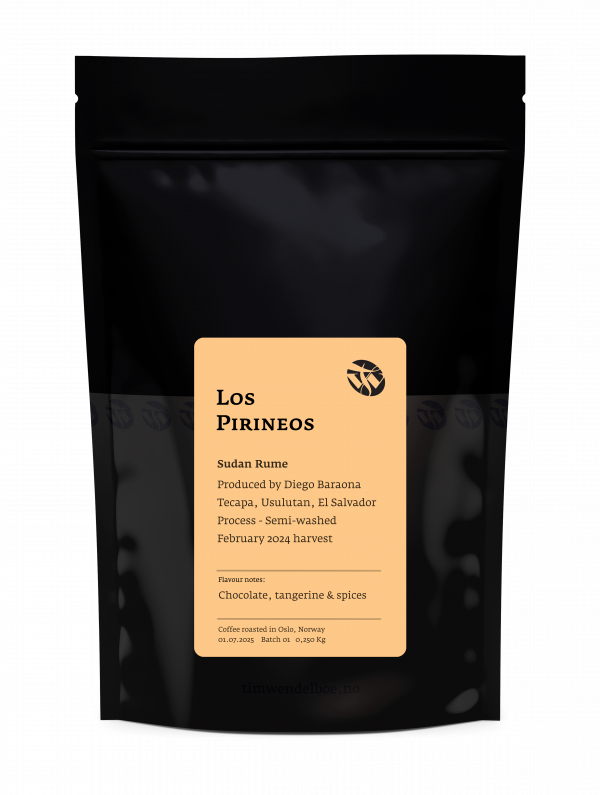| Cultivar | SL28 |
|---|---|
| Flavour Notes | Red fruits, floral & chocolate |
| Producer | Elias Roa & Bellanid Sanchez |
| Country | Colombia |
| Region | El Pital, Huila |
| Process | Washed |
| Harvest | May – June 2024 |
| Roast Profile | Light Roast |
| Contents | Whole Coffee Beans |
| Bag Size | 250g |
Finca Tamana SL28
kr239.00
The SL28 from Finca Tamana has a subtle floral note with fruity flavours of red berries.
Out of stock
Additional information
Tim's Notes
I planted these SL28 seeds with Elias in 2013 and the trees were planted in the field in early 2014. Since then we have gradually been able to buy more and more of this coffee.
The SL28 from Finca Tamana is quite subtle in the flavour profile but still has some of the classic SL28 flavours like red berries. It has a lower acidity and an interesting subtle floral and chocolate note. I find it to be quite different from the brighter and more intense Kenyan grown SL28 coffees.
Although it is not the most expressive coffee from this farm, it still offers a unique flavour profile that is different from the traditional Caturra, Castillo and varied Colombia cultivars that are the most common coffees grown in Colombia and at Finca Tamana.
The SL28 from Finca Tamana is quite subtle in the flavour profile but still has some of the classic SL28 flavours like red berries. It has a lower acidity and an interesting subtle floral and chocolate note. I find it to be quite different from the brighter and more intense Kenyan grown SL28 coffees.
Although it is not the most expressive coffee from this farm, it still offers a unique flavour profile that is different from the traditional Caturra, Castillo and varied Colombia cultivars that are the most common coffees grown in Colombia and at Finca Tamana.
Cultivar
SL28 is one of the most popular cultivars grown in Kenya because of its high yields and superior quality in the cup. It is no secret that I love this fruity cultivar that at its best taste like black currant juice, rhubarb or rose hip tea. SL28 was a selection made by the Scott Agricultural Laboratories in the 1930’s and along with the SL34 cultivar it is the most commonly grown cultivar in Kenya and an important reason why everyone thinks about fruity coffees when they speak of Kenyan coffees.
Process
Picking and sorting
Depupling, fermenting & washing
Drying
- The coffee is selectively hand picked by hired pickers under supervision of Elias. Cherries are hand-sorted before they are processed to make sure only ripe cherries are processed together.
Depupling, fermenting & washing
- The coffee cherries are stored in the cherry hopper in open air over night before the coffee is de-pulped in the morning. After de-pulping, the parchment coffee with the mucilage on is fermented for 24 hours in clean stainless steel tanks. The fermentation is stopped when the mucilage is easy to clean off and before the coffee flavour is influenced by negative fermentation flavours. The coffee is then washed in clean water by using an eco-mill which is a mechanical mucilage remover. The eco-mill reduces water waste from the average 50-100 litres of water per kilo of coffee with traditional washing methods to only 0,5 – 1 litre per kilo. After washing the coffees are soaked for 24 hours in clean water in tiled cement tanks. All floaters (beans with low density) are removed during the washing and soaking process.
Drying
- After the soaking stage the clean parchment coffee is dried in parabolic dryers and drying beds covered with shade nets to prevent the beans from over heating. The coffees are raked throughout the day to ensure even drying. Drying normally takes from 20 to 30 days and once the moisture content is below 11% it gets packed and stored in air tight grain pro bags. All our coffees from Finca Tamana are vacuum packed before it is shipped to Norway.
Shipping
For our Norwegian customers, we offer three shipping options:
- Pakke i Postkassen - With Pakke i Postkassen, tracking is provided, and delivery is estimated within 2-3 business days.
- Pakke til hentested - The parcel can be collected from a Post in Store, Post Office, parcel locker, or parcel box. This option includes tracking, with delivery expected within 1-5 business days.
- Norwegian Post, No Tracking (Brevpost) - This option does not offer tracking. Delivery is estimated within 2-5 business days.
How To Brew
Filter
- We strongly recommend using the correct measurements and brewing techniques when you brew our coffees. Use a digital scale both to measure water and coffee in order to get consistent results, and we recommend using between 60 to 70 grams of coffee per litre (1000g) of water, depending on the brewing method, water quality and coffee used.
- We strongly recommend using VST filter baskets. Both the 18g, 20g and the 22g basket is great for our coffee. The VST filters makes it a lot easier to extract the espresso properly which gives a lot more sweetness in the cup. They are also more or less identical to each other which makes it easy to be more consistent when brewing on several groups at the same time. You can buy the filters on our webshop, just make sure they fit your machine (ours fits all La Marzocco machines and machines with 58mm filter baskets). With the VST 18g filter basket, we recommend the following brewing parameters: 18-19g freshly-ground coffee, 25-35s brewing time, 35-38g of final brew liquid in the cup, 93°C-94°C brew water temperature.
Finca Tamana
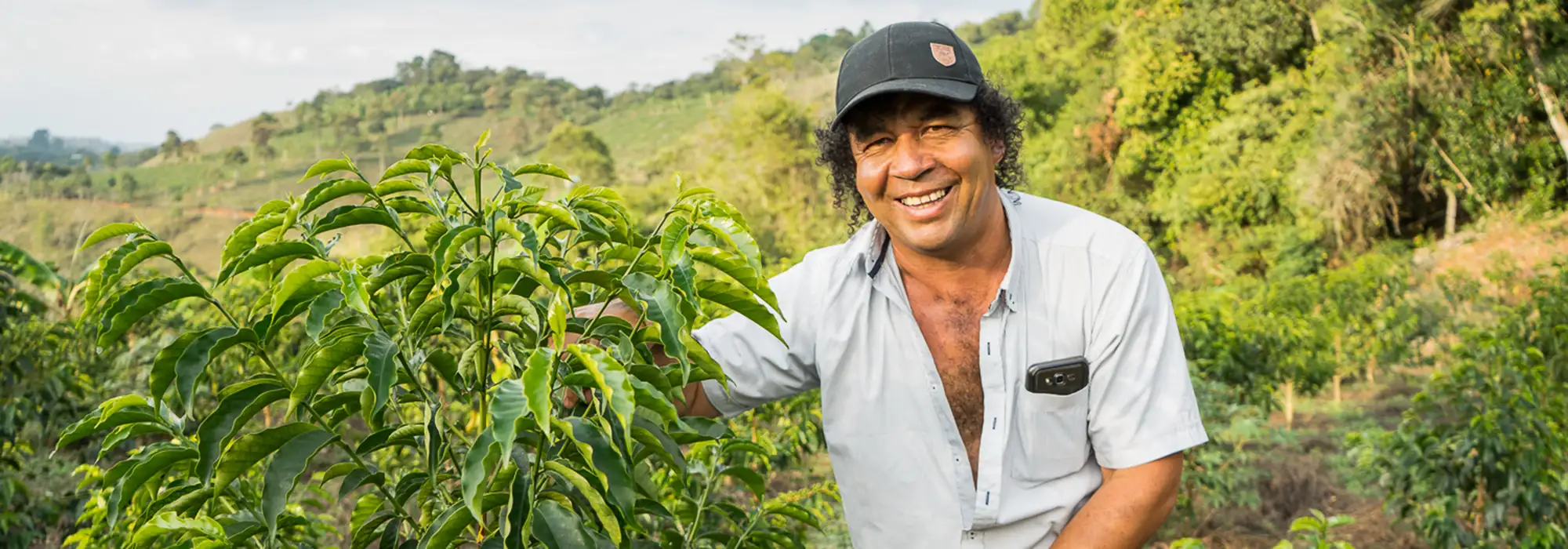
We started working with Elias Roa in 2012 and since then we have been working hard, every harvest, to improve the infrastructure at the farm as well as farming and processing practices. I first met Elias back in 2007 when I was traveling around Colombia with my friend and coffee exporter mr. Alejandro Renjifo. The aim of the trip was to find delicious coffees and potential farmers that I could work with to make sure we got a steady supply of tasty coffees from Colombia. While passing through the state of Huila I visited a small group of farmers in Acevedo that was lead by Elias. I remember we drank hot chocolate (!) and ate bread and cheese at his house and Elias gave me an impression of being a passionate and hard working farmer. Later that year I received a few samples from him but unfortunately his coffee was not meeting my quality requirements so nothing really came out of it.
Learn More About Finca Tamana
Transparency
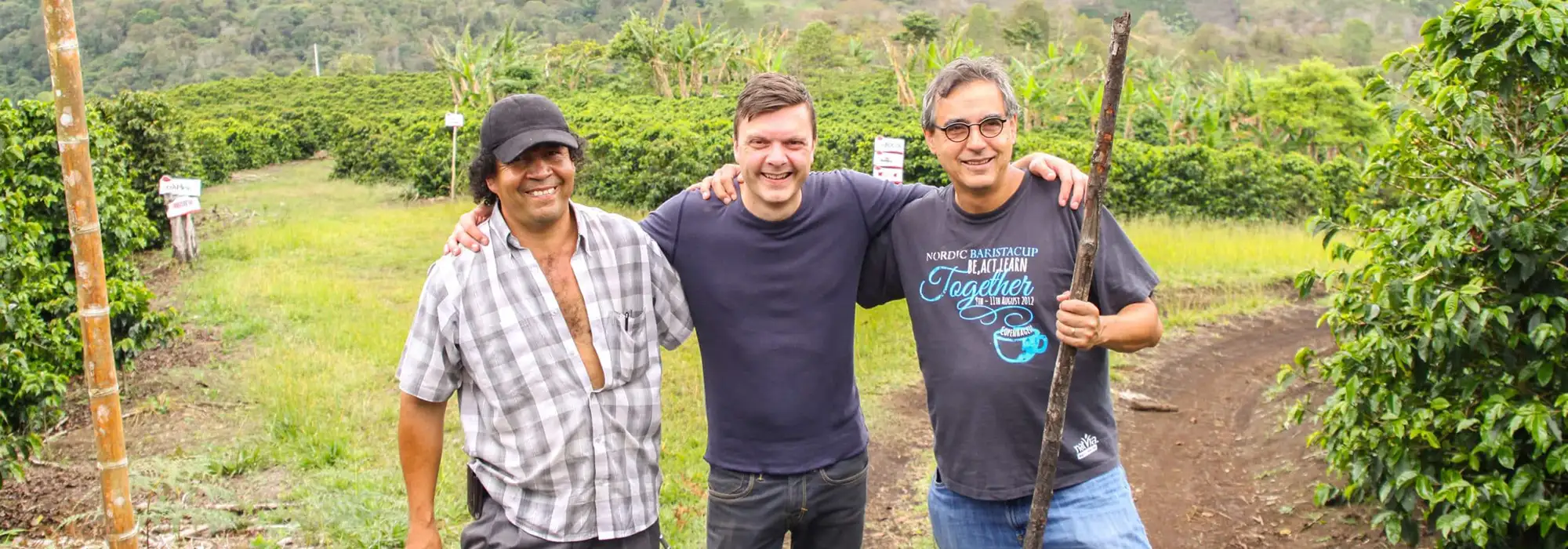
We buy coffee directly from Elias Roa, the farmer. Fairfield Trading, the exporter, provides milling and logistical service and the coffee is imported by ourselves directly to Norway.
Learn More About Transparency

